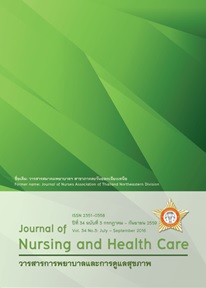ประสบการณ์ของผู้ดูแลในการดูแลผู้สูงอายุที่มีภาวะสมองเสื่อม Caregiving experiences of caregivers of older persons with dementia
คำสำคัญ:
ประสบการณ์ วิถีความเจ็บป่วย การดูแลผู้สูงอายุที่มีภาวะสมองเสื่อม ปัจจัยที่มีผลต่อการดูแล ผู้ดูแล experiences illness trajectory caregiving older persons dementiaบทคัดย่อ
บทคัดย่อ
การวิจัยเชิงคุณภาพนี้มีวัตถุประสงค์เพื่อศึกษาประสบการณ์ในการดูแลผู้สูงอายุที่มีภาวะสมองเสื่อมตามการรับรู้ของ
ผู้ดูแล คัดเลือกผู้ให้ข้อมูลแบบเฉพาะเจาะจง เป็นผู้ดูแลหลัก 10 ราย และผู้ดูแลรอง 14 ราย เก็บรวบรวมข้อมูลโดยการ
สัมภาษณ์เชิงลึก การสังเกตแบบไม่มีส่วนร่วม การจดบันทึกภาคสนามและศึกษาแฟ้มประวัติ ทำการศึกษาในระหว่างเดือนมีนาคม พ.ศ. 2556 – มีนาคม พ.ศ. 2557 วิเคราะห์ข้อมูลโดยวิธีการวิเคราะห์เชิงเนื้อหา
ผลการศึกษาพบว่า ผู้ดูแลรับรู้วิถีความเจ็บป่วยของผู้สูงอายุที่มีภาวะสมองเสื่อมเป็น 4 ระยะ ได้แก่ 1) ระยะหลงลืม
อารมณ์เปลี่ยนตามวัย 2) ระยะหลงลืมต้องรักษา 3) ระยะอาการขึ้นๆลงๆ และ 4) ระยะอาการแทรกซ้อนอาจเสียชีวิตโดยการดูแลผู้สูงอายุที่มีภาวะสมองเสื่อมของผู้ดูแลนั้น ผู้ดูแลให้การดูแลผู้สูงอายุตามอาการแต่ละระยะที่ผู้ดูแลรับรู้ ได้แก่1) ระยะหลงลืม อารมณ์เปลี่ยนตามวัย เป็นการดูแลตามธรรมชาติ ได้แก่ คงความจำ และปรับอารมณ์ ปัจจัยที่มีผลต่อการดูแล ได้แก่ ความรู้ของผู้ดูแลและครอบครัว ความสัมพันธ์ในครอบครัว และลักษณะครอบครัว 2) ระยะหลงลืมต้องรักษาเป็นการพยายามให้ทำกิจกรรมด้วยตนเอง ฟื้นฟูความจำ สื่อสารวิธีใหม่ ควบคุมและปรับอารมณ์ ป้องกันอันตราย ดูแลการนอนหลับ การดูแลกิจวัตรประจำวัน และการดูแลให้ได้รับยาและติดตามการรักษา ปัจจัยที่มีผลต่อการดูแล ได้แก่ ความรุนแรงของภาวะสมองเสื่อม การรับรู้อาการที่ผิดปกติของผู้ดูแลและครอบครัว การยอมรับและเข้าใจความเจ็บป่วยของผู้สูงอายุ การยอมรับบทบาทผู้ดูแล การสนับสนุนของครอบครัวการรักษาและการให้คำแนะนำของบุคลากรทางการแพทย์3) ระยะอาการขึ้นๆลงๆ มีการปรับการดูแลตามอาการ ปัจจัยที่มีผลต่อการดูแล ในระยะนี้ได้แก่ ความรุนแรงของภาวะสมองเสื่อม โรครว่ ม ประสบการณใ์ นการดูแลผูป้ ว่ ย การสนับสนุนของครอบครัว เครือขา่ ยทางสังคมและระบบบริการสุขภาพ และ4) ระยะอาการแทรกซ้อนอาจเสียชีวิต เป็นการดูแลเพื่อป้องกันภาวะแทรกซ้อน ได้แก่ การดูแลกิจวัตรประจำวัน การดูแลภาวะแทรกซ้อน และการดูแลระยะใกล้เสียชีวิต ปัจจัยที่มีผลต่อการดูแล ได้แก่ ความหวังการสนับสนุนของครอบครัว ความพร้อมของครอบครัว การสนับสนุนของทีมสุขภาพ และความเชื่อและค่านิยมของครอบครัวผลของการศึกษาครั้งนี้ ช่วยสะท้อนให้เห็นว่าการดูแลผู้สูงอายุที่มีภาวะสมองเสื่อมของผู้ดูแลเป็นไปตามการรับรู้และการใหค้ วามหมายของผูดู้แลแตล่ ะบุคคล ซึ่งผูดู้แลจะใหก้ ารดูแลตามการรับรูวิ้ถีความเจ็บปว่ ยเพื่อตอบสนองความตอ้ งการของผูสู้งอายุ โดยการดูแลขึ้นอยูกั่บปจั จัยเงื่อนไขตา่ งๆ ดังนั้นบุคคลากรผูใ้ หก้ ารดูแลจึงควรศึกษาและทำความเขา้ ใจธรรมชาติการดูแลเพื่อเป็นแนวทางในการพัฒนาคุณภาพทางการพยาบาลที่สอดคล้องกับประสบการณ์ของผู้ดูแลผู้สูงอายุที่มีภาวะสมองเสื่อมต่อไป
Abstract
The purpose of this qualitative research was to study experiences from the perspective of caregivers of older persons with dementia. Key informants were purposively selected including 10 primary caregivers and 14 secondary caregivers. Data was collected by in-depth interviews, non-participatory observations, field notes, and review of medical records. Interviews were conducted from March 2013 to March 2014. Data was analyzed by
using content analysis.The researcher found that the illness trajectory phases in older persons with dementia were classified by the caregivers into four phases: 1) mild level of forgetfulness caused by aging processes 2) severe level of forgetfulness that requires treatment 3) unstable symptoms and uncertain conditions 4) complications resulting from dementia and the terminal phase. Care for older persons with dementia was provided based on phases of progression and the caregiver’s perception. Caregivers tried to maintain older persons’ memory and emotional control during the first phase. Factors associated with care during this phase were caregivers’ and families’ knowledge, families’ relationship, and families’ characteristics. For the second phase, caregivers encouraged older persons to do their activities by themselves, promoted memory by using reminiscence technique, created
new methods to communicate, controlled emotion, prevented accidents and complications, promoted sleep, helped patients complete daily activities, administered medicine, and followed up with the physicians. Factors associated with care for this phase were the levels of severity of dementia, abnormal symptoms based on caregivers’ and families’ erceptions, acceptance and understanding of an elder persons’ illness, acceptance of a caregiver’s role,
family support, treatment and advice from health care professionals. For the third phase, the caregivers provided care that depended on older persons’ symptoms. Factors associated with care during this phase were the severity of dementia, co-morbidity, a caregiver’s experience, family support, social networks, and health care systems. For the final phase, caregivers provided care to prevent complications for older persons, such as daily living care, complication prevention, and end of life care. Factors associated with caring for this phase were family’s hope, family support, family preparedness, health care professionals’ support, and family beliefs and values. Results of the study indicated that the caregivers provided a variety of care for older persons with dementia and these care were based on individual caregivers’ perceptions. Caregivers provided care in response to patients’
needs based on their illness trajectory and many other factors. Health care professionals should be concerned with and understand the context of caring for older persons with dementia so that they can create specific care for this population. Providing care that complies with a patient’s context will eventually lead to a high quality of nursing care for these patients. Moreover, the findings from this study can be used to direct future studies about older persons with dementia.



